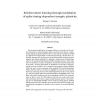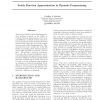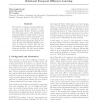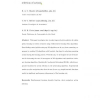536 search results - page 46 / 108 » Residual Algorithms: Reinforcement Learning with Function Ap... |
158
Voted
NECO
2007
15 years 2 months ago
2007
The persistent modification of synaptic efficacy as a function of the relative timing of pre- and postsynaptic spikes is a phenomenon known as spiketiming-dependent plasticity (...
120
Voted
ICML
1995
IEEE
16 years 3 months ago
1995
IEEE
The success ofreinforcement learninginpractical problems depends on the ability to combine function approximation with temporal di erence methods such as value iteration. Experime...
92
Voted
ICML
2006
IEEE
16 years 3 months ago
2006
IEEE
We introduce relational temporal difference learning as an effective approach to solving multi-agent Markov decision problems with large state spaces. Our algorithm uses temporal ...
136
Voted
ICML
1999
IEEE
16 years 3 months ago
1999
IEEE
Many interesting problems, such as power grids, network switches, and tra c ow, that are candidates for solving with reinforcement learningRL, alsohave properties that make distri...
126
Voted
HEURISTICS
2008
15 years 2 months ago
2008
This paper investigates how to make improved action selection for online policy learning in robotic scenarios using reinforcement learning (RL) algorithms. Since finding control po...




